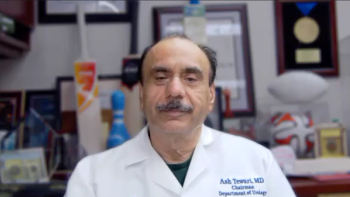
Sequencing Therapy Through Multiple Lines of Metastatic Urothelial Carcinoma
Expert perspectives on treatment sequencing pathways in metastatic urothelial carcinoma, with deference to recent trial data for both IO and ADC therapies.
Episodes in this series

Transcript:
Petros Grivas, MD, PhD: Srikala, going back to you, let’s say this patient gets gemcitabine-carboplatin because of the reasons Cora mentioned, would you still give maintenance avelumab regardless of gemcitabine-cisplatin or gemcitabine-carboplatin?
Srikala Sridhar, MD, MSc, FRCPC: Absolutely, I think the JAVELIN Bladder 100 study allows us to give maintenance regardless of gemcitabine-cisplatin, regardless of gemcitabine-carboplatin, regardless of the number of cycles between 4 and 6, regardless of PD-L1 status, and any time within that treatment-free interval. I think it was reassuring that we’re not trying to pick which patient specifically, so gemcitabine-cisplatin, gemcitabine-carboplatin, at least 4 cycles, I’d consider maintenance avelumab.
Petros Grivas, MD, PhD: That’s simple and easy as you said. Guru, think about this patient. So, gemcitabine-carboplatin, as Cora mentioned, and then you go for avelumab maintenance, Srikala mentioned that. Let’s say the patient does very well and 10 months later has progression of disease on maintenance avelumab. How would you approach that situation? What would you do next?
Guru P. Sonpavde, MD: Does this patient have an FGFR3 activating alteration, or does not?
Petros Grivas, MD, PhD: Let’s say both scenarios, no presence and then presence.
Guru P. Sonpavde, MD: Let’s say the patient does have an alteration, I think erdafitinib would be an option, as well as enfortumab vedotin. Of course, sacituzumab govitecan is yet another antibody-drug conjugate that’s available for select patients who might not be able to tolerate enfortumab or erdafitinib. If you don’t have an FGFR3 or FGFR2 activating mutation or fusion, then I think erdafitinib is not an option. So enfortumab vedotin is the drug with phase 3, level 1 evidence. Of course, you also have sacituzumab. I will point out that docetaxel remains an option. Late-line docetaxel does have some activity even after failing all these drugs, at least anecdotally.
Petros Grivas, MD, PhD: Interesting. Srikala, I know it’s your favorite topic, you have done trials looking at taxanes.
Srikala Sridhar, MD, MSc, FRCPC: I agree. I think in this situation my next step would be enfortumab vedotin, in part because of the response rate, it’s sitting around 40%, as well as the fact that I don’t need to do biomarker testing, which is important because that could cause some delays. Certainly, beyond enfortumab vedotin, I do go back to something like paclitaxel, which in our study from a long time ago did show response rates of about 20%, but if the patient responds that’s what you need. If they can tolerate it, it’s something I might go to later in the lines of treatment.
Petros Grivas, MD, PhD: It’s always good to have options for our patients. The question for you, Cora, is if you have a patient with an FGFR3 mutation, progression on avelumab let’s say 10 months later, would you go with erdafitinib or enfortumab?
Cora Sternberg, MD, FACP: I don’t think that we have enough data. I think there are 2 or 1 very small studies. Matthew Galsky, MD, was one of the authors who presented at ASCO GU [American Society of Clinical Oncology Genitourinary Cancers Symposium], and the suggestion was maybe it’s better to go with erdafitinib first, but I think it was such a small study
Petros Grivas, MD, PhD: Sometimes the toxicity profile may play a role, so if someone has bad neuropathy, you may go with erdafitinib. If someone has trouble swallowing, for example, erdafitinib is an oral drug, so you may go with enfortumab. Any comments on that, Tian?
Tian Zhang, MD, MHS: I think sequential data are hard to come by, erdafitinib after enfortumab vedotin, or enfortumab vedotin after erdafitinib. But what’s clear I think is that our patients with FGFR alterations are sensitive to both. I’ve had patients who have had FGFR alterations who have received both enfortumab vedotin as well as FGFR inhibitors, and they’re sensitive, so they can have disease responses. Allowing them to be exposed and see what benefit each of these drugs has for them is really important, so I wouldn’t rule it out if they do have documented FGFR alterations.
Transcript edited for clarity.
Newsletter
Stay up to date on recent advances in the multidisciplinary approach to cancer.








































